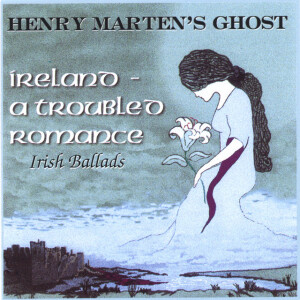 Henry Marten’s Ghost, a strange name for a band you might think, but not when you read the cover notes and realise that the band was born out of Oxford, England. Henry Marten, born in Oxford, was one of the signatories on the death warrant for King Charles I. He was a Parliamentarian who supported the cause of the Irish during Cromwell’s invasions. For urging peace with the Irish, Henry Marten was tried and imprisoned for treason in Chepstow castle, where he died in 1680.
Henry Marten’s Ghost, a strange name for a band you might think, but not when you read the cover notes and realise that the band was born out of Oxford, England. Henry Marten, born in Oxford, was one of the signatories on the death warrant for King Charles I. He was a Parliamentarian who supported the cause of the Irish during Cromwell’s invasions. For urging peace with the Irish, Henry Marten was tried and imprisoned for treason in Chepstow castle, where he died in 1680.
So what’s this got to do with the music? Well nothing really except the album is sub-titled Irish Ballads, and that’s what you get, although some of the songs naturally lean towards the Irish rebel’s view of the troubles around 1916. The first bite is with the eye, and I must say the album has one of the nicest front cover and inset notes I have seen for a while. You can actually read most of the information with out having to reach for your glasses and magnifying glass. Full marks to Maire McSorley for the cover design and artwork.
The band are Belfast-born Padriag Lawlor: lead vocals & guitar, Piotr Jordan: fiddle, Chris Knipe: mandola, and Maire McSorley: Bodhran. The album was recorded at Ergo Studios, Oxford. This is a good studio production, with usual overlaying for some of the instruments, mostly the violin. Overlaying is something we have come to expect these days, but overall the result is pleasant and not too ambitious. Padriag Lalor sings well in handling all the vocals.
My only reservation with the album as a whole is in the choice of songs. The album starts with ‘Come by The Hills’ followed by ‘Spancil Hill’, ‘Cunla’, ‘The Galway Shawl’, ‘Step it Out Mary’. ‘I wish I was Back Home in Derry’, ‘Carrickfergus’, ‘Grace’, and three other popular Irish standard ballads. If I said there is nothing new on this album this would only be half-true. There is one song that is not heard very often, it is a rebel song called ‘Tom Williams’, about the young man who at the age of 19 was hanged for his part in the Irish troubles in 1942. Not until January 2000 was his body exhumed from within the walls of the prison and buried in consecrated ground.
To sum up, what the album lacks in new or unusual material, it makes up for it in listening pleasure. Padraig is singing the songs he loves to sing. The songs must be popular, because I guarantee you will hear at least four out of the 11 songs being sung at any singer’s session or folk club, on any night of the week. If, like me, you are an established collector of Irish folk music, you may find you already have these songs on other albums with similar arrangements. But if you were new to Celtic music, you are in for a rare treat and should be well pleased buying this album.
(Henry Marten’s Ghost, 2002)
